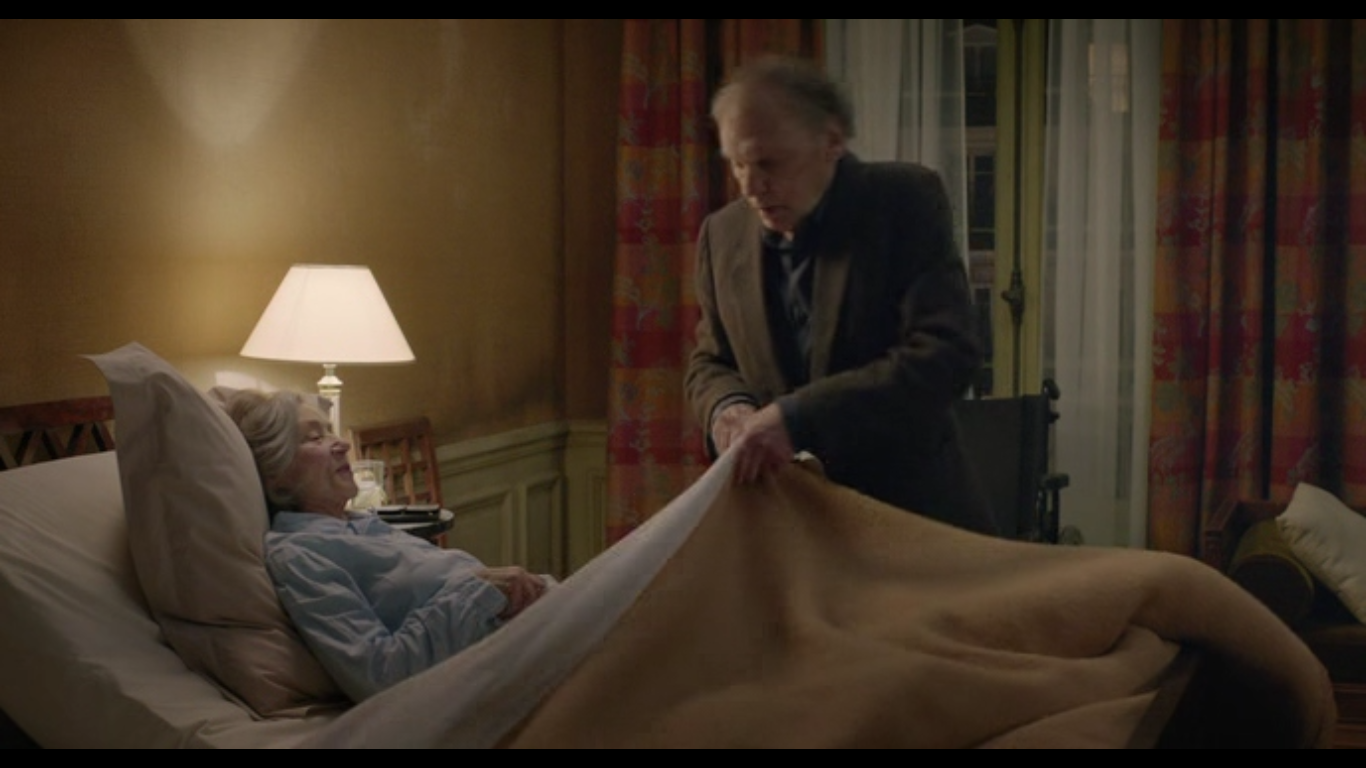Love means never having to say you’re sorry. It is better to have loved and lost than never to have loved at all. Love is a many splendid thing. Love is patient. Love is kind. Many a poet has tried to find a beautiful metaphor for that happily ever after. However, the happily ever after in the real world sometimes means daily sacrifice for the one you love. The day-to-day little acts give a real power to Michael Haneke’s Amour, a strong showcase of what true love actually IS, not what it represents.
Retired musicians Georges (Jean-Louis Trintignant) and Anne (Emmanuelle Riva) live a comfortable routine in their retirement residence. The occasionally will catch a show by a former pupil or get a visit from their daughter (Isabelle Huppert). The days can blend together, but they are content. One day, Anne suffers a stroke, incapacitating her right side. Georges learns to adapt, taking a hands on role caring for his wife (since she doesn’t want to be hospitalized). As her condition approaches death, he insulates from the outside world, hiring a nurse and dedicating his whole waking moment to Anne.
Amour’s strength is its ubiquity. I saw pieces of the long-term relationships in my family. My parents instantly know when the other is withholding information, so they speak in stream of consciousness. Many grandparents skip the fighting part of the conversation and go right to the end: silence. Having similar meals, withholding stories to use at a timely point, and uninhibited honesty are all on display in Amour. The burden to carry this out is on the two actors. Both are established thespians more than capable of carrying on a normal conversation while simultaneously showing the mechanics of their thought process. Riva’s role is more powerful due to the escalating helplessness, but Trintignant is equally strong in his staunch determination to care for his love. Both deserve Oscar consideration.
Director Michael Haneke must really despise the shaky cam. Many of the scenes in this movie a camera is placed in one specific location and left shooting for extended periods of time. This gives Amour a lethargic pace and stillness that can sometimes be uncomfortable. Sometimes Haneke lingers too long on a particular shot or picture, and sometimes the shots feel too artistically embellished. More often than not, however, these long shots give Amour added substance through the fly on the wall routines of Anne and Georges.
The build-up of the routine responsibilities pay off down the line through the relationship between Georges and his daughter. Georges so enjoys the routine he has with Anne that he is willing to sacrifice other bonds to focus on her. His daughter has concerns with her mother as well, and since she has her own life, she comes in with her own ideas for what is best for her mother. Georges knows better, and has to keep her daughter from intervening in the routine as best he can since she is not necessary. It is not that he doesn’t love his daughter, it is because his life does not need her presence right now. This is particularly complicated and messy and executed very well by Huppert and Trintignant.
Amour was given the Palme D’Or at the Cannes Film Festival. That award has only been given to a select group of movies, including The Tree of Life, Pulp Fiction, and Sex, Lies, and Videotape. While these movies might be more ambitious, none of them have the honesty and simplicity of Amour. It reminds us how much work, both mental, physical, and time go into demonstrating that thing that every person desires at some point: love. As scary and sad as death can be, Amour reminds us that it isn’t so bad if you don’t have to face it alone.

